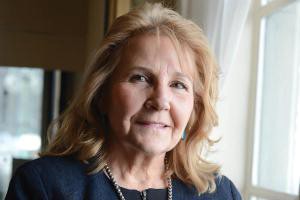
Photo by Cynthia Munster, courtesy of UCObserverMarie Wilson is an award-winning journalist, lecturer, executive manager, and social justice advocate. As one of three Truth and Reconciliation Commissioners, she dedicated six and a half years to witnessing 7000 testimonies from residential school survivors across Canada. Their voices endure for Wilson - "I hear them in my head every day," she said. Last week, she brought those voices with her to North Campus to share their message with the University of Alberta.
Wilson's passionate keynote launched the three-day Faculty of Arts event, "Truth and Reconciliation, Good Relations, and Indigenizing the Academy." Recounting personal stories, and reading directly from the testimonies of survivors, Wilson challenged us to think differently about identity, history, education, knowledge, and reconciliation.
While she inspired countless moments of critical reflection throughout the evening, here are seven thought-provoking quotes from Wilson's address:
"We're involved in a national project of remedial learning, and the academy is in the front row."
Wilson didn't shy away from a critical analysis of the U of A's role in reconciliation - especially when it comes to learning. We need "to recognize with deep humility that the university, and those who work here, are not the resident experts on the subject at hand when it comes to residential schools," she said. The experts are the survivors of the residential school system who have been speaking to the Commission, who have taken on the courts, the federal government, and the national churches, and who "have forced this national classroom of learning new history about ourselves, for which we should all be - rightly - extremely uncomfortable, and infinitely grateful."
"When we talk about the history and legacy of residential schools, it is also acknowledging that it is not over."
As just one example, Wilson cited statistics on the Canadian child welfare system, which continues to separate a disproportionate number of Indigenous children from their families and communities today. These statistics are worsening rather than improving, she said.
"We as a country are living with the massively failed results of a major, long-term, national public policy initiative."
The residential school policy initiative was contemplated, voted on, and passed into law by people who were, in many cases, well educated and well informed. It then went widely unchecked for 130 years. "We cannot change that past," Wilson said, "but here we are today, and this is surely our accountability now."
"I see you. I hear you. And I believe you."
Wilson expounded the value of spaces for Indigenous voices to tell their stories, and to be heard. During her first national TRC event, Wilson describes participating in a sharing circle, and feeling that she had nothing to contribute. Instead, she said simply: "I see you. I hear you. And I believe you." Afterwards, a line-up of people told her, "I have waited my whole life to hear that."
"Reconsider what is expert? What is expertise?"
While working at CBC North, Wilson re-evaluated her concept of expertise. It's one of the ways that we can challenge the prioritization of knowledges, she suggests. "I zeroed in on that one clause in those incredibly long, over-written job descriptions that said, 'or other related experience.'" Under that clause, she included surviving residential school, retaining local language abilities, knowing local contexts and communities, and understanding regional governance processes. "It doesn't always work," she confided. "But I also hired people who went on to have illustrious careers, won Aboriginal achievement awards, and made huge contributions not only in broadcasting, but in other fields."
"We have been investing in our collective ignorance, and we have to stop."
As she does so often, Wilson deferred to the voices of children to make her point. She still remembers a young girl, shaking with anger, who told her, "You know, you have taught us about the American civil rights movement. You have taught us about Apartheid in South Africa. You have taught us about Bosnia. You have taught us about the Palestinian-Israeli Conflict. You have taught us about the religious wars in Northern Ireland. And you have not taught us the truth about our own country."
And, finally, Wilson finished by acknowledging the challenge - and the reward - that awaits us further down the pathway to reconciliation:
"It's not going to be fast, and it's not going to be easy, but it's going to be rich and uplifting for us all."
"Truth and Reconciliation, Good Relations, and Indigenizing the Academy" is the first in an ongoing series of events and workshops, organized by the Faculty of Arts, focusing on Indigenous research, teaching & learning, community engagement and language revitalization.ongoing series of events and workshops, organized by the Faculty of Arts, focusing on Indigenous research, teaching & learning, community engagement and language revitalization.